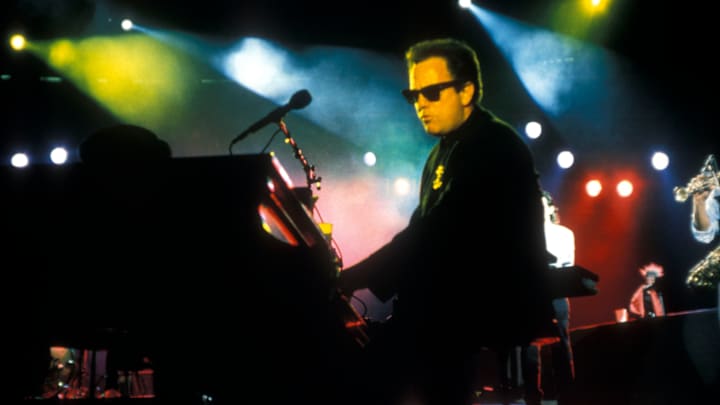
Verse 1: 1949
Harry Truman
Harry Truman was the 33rd president, who served from 1945 to 1953. He was vice president to Franklin D. Roosevelt and became president when Roosevelt passed away three months after taking office an unprecedented fourth time. Truman was responsible for implementing the Marshall Plan, to help rebuild the economies of Western Europe after World War II, and also for the deployment of nuclear weapons against Japan.
Doris Day
Doris Day was one of the most famous film stars and singers of the 50s and 60s. She released more than 650 songs between 1947 and 1967 and was nominated for an Academy Award for Best Actress for the film Pillow Talk, also starring Rock Hudson. She passed away in 2019 at the age of 97.
Red China
In 1949, the Chinese Civil War came to an end after 22 years with the Chinese Communist Party, led by Mao Zedong, proclaiming the establishment of the People's Republic of China. Since the October Revolution in Russia, "Red" has been associated with Communist governments, making this the new, formal, "Red China."
Johnnie Ray
Johnnie Ray was a singer, songwriter, and pianist, who was discovered and signed to a record label in 1949. Prior to being signed, he'd developed a cult following performing in African-American nightclubs. As a white rock 'n' roll pianist influenced by African-American gospel, you can imagine why he'd be name-checked by Billy Joel.
South Pacific
The Broadway musical South Pacific debuted in 1949. Based on the Pulitzer Prize-winning novel by James A. Michener, the musical was written by Rodgers and Hammerstein. It explores issues around interracial relationships in a way that was revolutionary at the time.
Walter Winchell
Walter Winchell was a newsman who worked in both newspapers and radio. On the radio, he had a casual jokey style of reading the news, with jazz-age slang, and a signature staccato cadence harking back to his beginnings on Vaudeville. He was politically outspoken and was one of the first Americans to attack Adolf Hitler and American pro-Nazi organizations. But he also aligned himself with McCarthyism, and is remembered for unfortunate journalistic ethical lapses, including spreading misinformation about the polio vaccine.
Joe DiMaggio
Joe DiMaggio is to this day possibly history's best known baseball player. In 1949, DiMaggio became the first baseball player to break $10,000 in earnings, which would be over 1.2 million dollars in today's money, and he held a record for the longest hitting streak that stands to this day. He's also a pop cultural phenomenon, appearing in TV commercials and marrying Marilyn Monroe. He's been name-checked in other classic songs, such as Simon and Garfunkel's "Mrs. Robinson" and Madonna's "Vogue," as a symbol of celebrity glamour in one instance, and the innocence of the past in the other.
Joe McCarthy
Joseph McCarthy was the senator for the state of Wisconsin from 1947 until his death in 1957. He was the most public face of the crusade against communist subversion of the United States government, believing that Soviet spies and sympathizers had infiltrated the civil services, academia, and the film industry. He also pursued a similar crusade against alleged homosexuals in the civil service, believing them to be vulnerable to Soviet influence. His crusades are only remembered for demagogic and reckless character attacks made during senate hearings. The term "McCarthyism" was coined to describe such politically motivated paranoid attack campaigns.
Richard Nixon
Richard Nixon was the 37th president, best known for the Watergate scandal, and resigning in disgrace. However, his inclusion in the first verse is due to his tenure as a congressman from 1947 to 1950, or possibly his campaign for the senate in 1950.
Studebaker
The Studebaker car company symbolized post-war American affluence, with their slogan "First by far with a post-war car." The slogan was also a reference to their role as wartime production contractors, building engine assemblies and nacelles for the infamous B-17 "flying fortress" bomber. The aesthetics of warplanes, particularly the Lockheed P-38 Lightning, influenced the look of the cars, with distinctive aviation-inspired design elements, creating the template for the quintessential American mid-century automobile.
Television
The first television broadcast in the United States was in 1928, but it wasn't until the post-war period that the medium took off. After television broadcasts ceased during World War II, the number of new stations rose rapidly. This is known as the "golden age of television," and saw the appearance of genres unique to television (as opposed to film and radio) such as soap operas, sitcoms like I Love Lucy and Father Knows Best, crime procedurals like Dragnet, and chat shows like The Jack Paar Show. The 50s is when television went from being a technology and a medium to being a cultural phenomenon.
North Korea, South Korea
After Japan surrendered at the end of World War II, the Korean peninsula, which Japan had previously annexed, was split into two, with the north half being occupied by the Soviet Union and the South by the United States. After the US and Soviet withdrew between 1948 and 49, North Korea invaded the South, resulting in the Korean War, which raged until 1953. The Korean War had a higher proportional death toll than either WWII or the Vietnam War. Hostilities ended with an armistice, but not a peace treaty, meaning North and South Korea are still technically at war.
Marilyn Monroe
Marilyn Monroe was possibly the single most famous sex symbol of the 50s and 60s. Though her career began in the mid-forties, 1949 was her breakthrough year. Before her tragic death in 1962, her films had grossed over $200 million, which is around $200 billion in today's money. Today she's remembered as an avatar of the sexual revolution, as well as a tragic cultural heroine due to her short and storied life.
